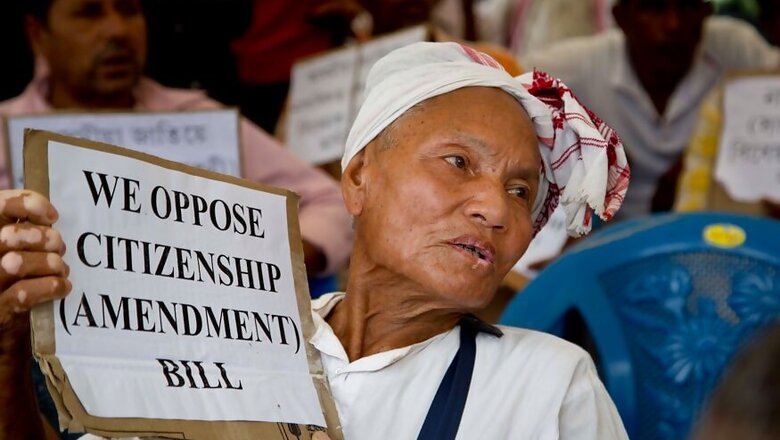
views
New Delhi: India’s narrowing claims to citizenship have pushed for a paradigm shift in the inclusion of citizens and exclusion of illegal immigrants. It progressively restricted citizenship by birth, but made it conditional and contingent on Indian origin.
The Citizenship Act 1955 came into effect five years after India’s constitution as a Republic and eight years after Independence. Over the years, it has been amended by successive Acts of 1986, 2003, 2005 and 2015 which introduced different modes to citizenship.
With the Citizenship (Amendment) Bill being introduced in Parliament on Monday, the claim to citizenship may now rest on a different mode of acquisition: a non-Muslim religious identity. It seeks to grant Indian citizenship to Hindus, Jains, Christians, Sikhs, Buddhists and Parsis from Bangladesh, Pakistan and Afghanistan if they have fled their respective country due to religious persecution.
So far, Indian citizenship was only offered by modes of acquisition like birth, descent, naturalisation and registration.
With the Citizenship Act, determination of citizenship becomes the all-encompassing to-be achieved status with the right to individual freedom, the right to participate in the exercise of political power, and the right to security and share in social heritage – to consolidate Indian identity.
Citizenship by birth
In 1955, the Act cited the claim to citizenship under the inclusive jus soli (by birth) principle, which meant anyone born in the territory of the country is an Indian. Persons domiciled in the country as on November 26, 1949 automatically became Indian citizens as the Constitution came into force.
In addition, any person born in the country between January 26, 1950 and July 1, 1987 is a citizen of India by birth. The latter date is when the first amendment to the Act, in 1986, came into force.
However, the 1955 Act, under Section 5, also provided that a person of Indian origin may, via application, register as a citizen of India if he or she is resident in the country for seven years.
Foreign citizens are allowed to be naturalised as Indian citizens by living in the country for 11 years. The new amendment in 2019 proposes to reduce this to five years.
Citizenship by descent
Although illegal immigrants under India’s citizenship regime are to be denied rights, their detection played an indispensable role in identifying genuine citizens. It wasn’t until the 1986 and 2003 amendments to the Act that India moved towards a more exclusionary jus sanguinis (right of blood) conception of citizenship.
The amendment in 1986 – at the behest of the Assam Movement between 1979 and 85 against illegal immigration – for the first time since Colonial rule, openly associated migration with illegality. It stated illegal migrants need to be registered with an Indian consulate in a given format to get Indian citizenship.
The 1986 and 1992 amendments to the Citizenship Act, together, held that it is no longer adequate to be born in India to be granted citizenship. It held that for a person born outside Indian on or after January 26, 1950 but before December 10, 1992, citizenship will be granted by descent if their father is a citizen.
Those born outside India after December 10, 1992 will be granted citizenship if at least one of their parents is an Indian citizen.
The 2003 amendment strengthened the association of descent and citizenship further by providing Overseas Citizenship of India (OCI) which distinguished the legality of the diaspora. The migrant is illegal on account of his or her descent.
Citizenship by origin
India introduced the concept of dual citizenship amid growing demands from its overseas diaspora. The Centre brought in the concept of person of Indian origin (PIO) in 2002 and Overseas Citizen of India (OCI) in 2006 as categories of persons legally allowed to enjoy rights as given in the Constitution.
These categories of people are not dual citizens or nationals as the Constitution does not allows dual citizenship. The ministry of home affairs offers citizenship by registration to PIO and OCI by registering them with respective cards if their births have been registered in a foreign country within one year of their birth. The rights enjoyed by these persons are almost at par with Indian nationals.
In 2015, the BJP-led government at the Centre introduced the latest amendment to the Citizenship Act by bringing in the concept of Overseas Citizen of India Cardholder (OCC), which replaces and merges the OCI and PIO legislation.
While the concept of citizenship – from origin to religion – has potentially changed with the new amendment Bill, the OCC cardholders will continue to enjoy their rights. The overseas Indian diaspora will be granted citizenship under the same statute set in place in 2015.
Citizenship by religion
If the 2019 Bill is passed, persons belonging to non-Muslim communities would not be jailed or deported under the Passport (Entry into India) Act of 1920 and the Foreigners Act of 1946. It sets December 31, 2014, as the cut-off date after which any person moving to India from these neighbouring countries will be considered for citizenship.
This proposed legislation has received considerable flak due to the perceived threat to minorities. According to detractors, the Bill also goes against Article 14 of the Constitution which guarantees the right to equality.




















Comments
0 comment